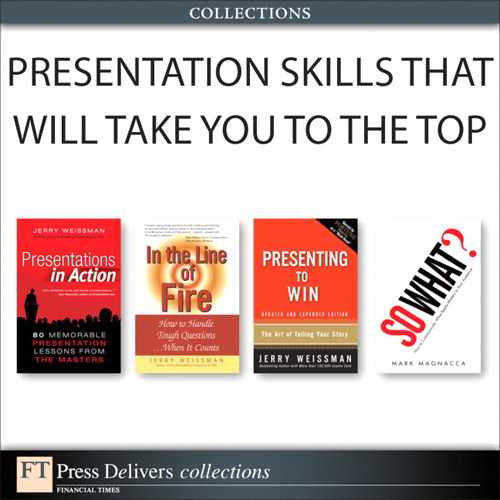17. Presentation Advice from Steve Jobs: The Power of Positive Words
One of the bestselling books in the “Running Meetings and Presentations” category on Amazon is The Presentation Secrets of Steve Jobs: How to Be Insanely Great in Front of Any Audience. Author Carmine Gallo offers his readers presentation lessons from the charismatic Apple CEO. Another lesson comes from Neil Curtis, a conceptual artist who created a mashup of the launch presentation for the iPad. The clever video clip (available on YouTube) strings together the scores of adjectives that Mr. Jobs and his Apple copresenters used during the event—multiple iterations of extraordinary, phenomenal, great, awesome, super, amazing, and terrific.F17.1 All are quite appropriate for a product launch.
As Miguel Cervantes said, faint heart ne’er won fair lady.
But too much of a good thing can become a bad thing. Too much milk or too many carrots can make you sick. Self-praise is no compliment. Furthermore, after the Internet bubble, the real estate bubble, and Bernie Madoff’s Ponzi scheme, the public—particularly the technology public—is very wary of hyperbole. Vaporware is a dirty word.
Such cautionary advice might seem a contradiction in terms coming from someone whose company’s first name is “Power,” but I work both sides of the aisle, providing advice on how to add punch to presentations as well as to tone down any oversell. Given my stock in trade of IPO road shows, the latter is an absolute requirement. After the painful burst of the Internet bubble and the rigorous remediation of the Sarbanes–Oxley Act, no company can put itself at risk with even a hint of hyperbole. As a coach, I closely monitor that factor.
However, most of my coaching is focused on the other side of the aisle: adding punch. Most of that effort is in elevating the level of assertion in a presenter’s narrative language; not to insert Jobs-like adjectives. This is an equal opportunity task. All presentations, from the highest-profile IPO road show to the most basic product pitch, tend to use weak verbiage that diminishes the strength of the message.
Consider the three most commonly used phrases in presentations:
• “We believe ...”
• “We think ...”
• “We feel ...”
The use of these phrases increased dramatically in this Sarbanes–Oxley era to avoid forward-looking statements, but the phrases have been with us far longer. I know not from where they came, but their presence is pervasive. They are all formations in the conditional tense that impart doubt to any words that follow. Power Presentations are not doubtful presentations.
This is not to recommend that presenters should switch to the declarative tense and start forecasting results or selling snake oil, but to switch to more assertive words within the conditional tense:
• “We’re confident ...”
• “We’re convinced ...”
• “We expect ...”
Now that’s a Power Presentation.
